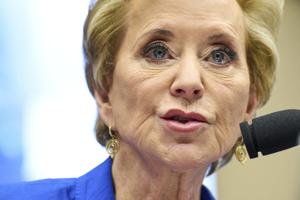WASHINGTON — The University of Pennsylvania announced a significant modification to its swimming records on Tuesday, revising those set by transgender swimmer Lia Thomas. This move is part of a settlement agreement with the U.S. Department of Education, which addresses the participation of transgender athletes in women’s sports. The university also pledged to apologize to female athletes who were “disadvantaged” by Thomas’s participation on the women’s swimming team.
The agreement resolves a high-profile federal civil rights case centered on Thomas, who made history in 2022 as the first openly transgender athlete to win an NCAA Division I title. The case was initiated during the Trump administration’s efforts to restrict transgender athletes’ participation in female sports, concluding that the University of Pennsylvania had violated the rights of female athletes.
Background and Context
The controversy surrounding Lia Thomas gained national attention when she competed for the Ivy League school during the 2021-2022 season. Thomas set program records in the 100, 200, and 500 freestyle events. These records have now been reassigned to other athletes, as reflected on the university’s website, which includes a note acknowledging the eligibility rules in effect at the time.
University President J. Larry Jameson stated, “While Penn’s policies during the 2021-2022 swim season were in accordance with NCAA eligibility rules at the time, we acknowledge that some student-athletes were disadvantaged by these rules.” He further emphasized the university’s commitment to compliance with federal requirements and NCAA rules.
Federal Settlement Details
Under the settlement agreement, Penn is required to restore all individual Division I records and titles to female athletes who were surpassed by Thomas. Additionally, the university must issue personalized apology letters to each affected swimmer. The agreement also mandates that Penn will not allow males to compete in female athletic programs and must adopt “biology-based” definitions of male and female.
“The Department commends UPenn for rectifying its past harms against women and girls, and we will continue to fight relentlessly to restore Title IX’s proper application,” said Education Secretary Linda McMahon.
Implications and Reactions
This development has sparked a range of reactions. Former University of Kentucky swimmer Riley Gaines, who has been vocal about her opposition to transgender athletes in women’s sports, expressed her surprise on social media, questioning, “Are pigs flying?” Gaines’s activism began after sharing a locker room with Thomas at the 2022 NCAA championships.
The Education Department’s investigation, which began in February and concluded in April, found that Penn had violated Title IX, a 1972 law prohibiting sex discrimination in education. Typically, such findings are resolved through voluntary agreements. Had Penn contested the findings, the department could have escalated the case to the Justice Department or pursued actions to withdraw federal funding from the university.
Broader Impact and Future Considerations
The NCAA’s response to this settlement remains uncertain. The organization has previously updated its record books in cases of recruiting and other violations, but it has not yet addressed the federal government’s request to restore titles and records affected by transgender participation. The complexity of determining past events involving transgender athletes adds to the challenge.
As the landscape of collegiate sports continues to evolve, universities and governing bodies face the ongoing challenge of balancing inclusivity with fair competition. The settlement with Penn highlights the broader national debate over transgender athletes’ participation in sports, a topic that continues to evoke strong opinions and policy discussions.
Looking ahead, the implications of this settlement may influence future policies and legal frameworks surrounding transgender athletes in sports, as educational institutions strive to align with both federal mandates and evolving societal norms.
 Viral Video Misrepresents Myanmar Quake Damage as Bangladesh Corruption
Viral Video Misrepresents Myanmar Quake Damage as Bangladesh Corruption Australia Tightens Childcare Safety Laws Amid Abuse Scandal
Australia Tightens Childcare Safety Laws Amid Abuse Scandal Stefanik Challenges Columbia University Over Alleged Civil Rights Violation
Stefanik Challenges Columbia University Over Alleged Civil Rights Violation Dalai Lama Confirms Continuation of Spiritual Lineage Amidst Political Tensions
Dalai Lama Confirms Continuation of Spiritual Lineage Amidst Political Tensions Jury Deliberations Continue in Sean “Diddy” Combs Trial Amid Racketeering Dispute
Jury Deliberations Continue in Sean “Diddy” Combs Trial Amid Racketeering Dispute